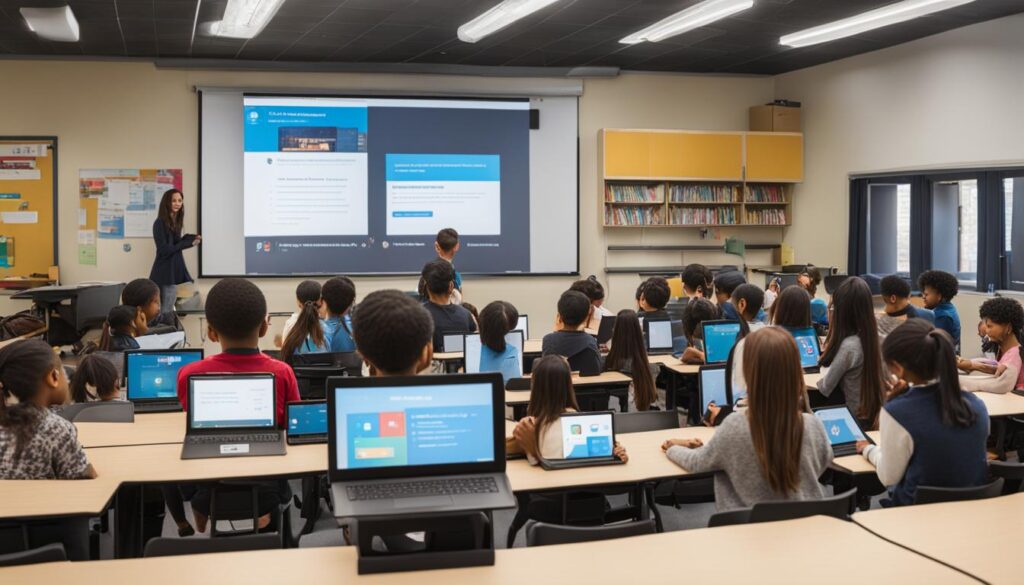In today’s digital age, we have the chance to revolutionize classrooms using the capabilities of artificial intelligence (AI) teaching tools. These groundbreaking tools incorporate AI and machine learning to provide dynamic and customized learning experiences for students. By tapping into the possibilities of AI, we can modernize education and equip our students for the future.
Key Takeaways:
- AI teaching tools have the potential to revolutionize education by creating dynamic and engaging learning environments.
- These tools leverage the power of AI and machine learning to personalize learning and automate assessments.
- Conquer.ai is an example of an AI-powered tool that seamlessly integrates with Google Classroom and offers features like automated assessment tools and AI-generated questions.
- AI in education provides benefits such as personalized learning, increased accessibility, streamlined assessments, and improved engagement.
- Proper training and guidance are essential for successful integration of AI tools in the classroom, ensuring effective use and ethical considerations.
The Hype around AI Tools in the Classroom
As the education landscape continues to evolve, there is a growing excitement surrounding the use of AI tools in the classroom. These innovative tools, powered by artificial intelligence, promise to revolutionize teaching and learning experiences, providing personalized support and automated grading. With the potential to enhance instructional practices and create interactive learning environments, AI tools hold the promise of transforming education as we know it.
However, amidst the hype, many educators remain skeptical of the actual functionality and effectiveness of these AI teaching tools. Questions arise about their ability to truly personalize learning and address the unique needs of each student. Concerns also exist regarding the reliance on automated assessments and whether they can accurately evaluate student performance and provide meaningful feedback. It is essential for educators to critically examine the potential benefits and limitations of AI tools before fully embracing their integration in the classroom.
The Need for Evidence-Based Evaluation
While the excitement around AI tools is warranted, it is crucial to approach their implementation with a critical lens. Educators should seek evidence-based evaluations and research on the effectiveness of AI tools in improving student outcomes. This will help determine whether these tools truly live up to their promise and if they can provide the desired learning outcomes for students. By engaging in evidence-based evaluation, educators can make informed decisions about the integration of AI tools in their classrooms.
Table: Pros and Cons of AI Teaching Tools
| Pros | Cons |
|---|---|
| Personalized learning experiences | Lack of human interaction |
| Automated grading and feedback | Potential for biased algorithms |
| Enhanced engagement and interactivity | Privacy and data security concerns |
| Improved administrative efficiency | Reliance on technology |
As the education community continues to explore the potential of AI tools in the classroom, it is essential for educators to critically evaluate their effectiveness and consider the potential benefits and limitations. By doing so, we can leverage the power of AI to create dynamic and engaging learning environments that meet the diverse needs of our students.
Introducing Conquer.ai: A Powerful Tool for Teachers and Students
In the ever-evolving landscape of education, AI teaching tools are gaining traction as powerful resources to enhance learning experiences. Among these tools, Conquer.ai stands out as an innovative solution that bridges the gap between the hype and reality of AI in the classroom.
Developed by an educator passionate about integrating technology into education, Conquer.ai harnesses the power of AI and Google products to create a seamless and user-friendly experience for teachers and students alike. With features such as automated assessment tools and AI-generated questions, Conquer.ai offers a comprehensive solution to enhance instructional practices.
Designed with the diversity of classrooms in mind, Conquer.ai provides teachers with the ability to personalize learning, assess student progress, and create interactive lesson plans. By leveraging AI-powered teaching resources, educators can optimize their time and effort, allowing for more effective and engaging instruction.
Automated Assessment Tools
One of the notable features of Conquer.ai is its automated assessment tools. With a few simple clicks, teachers can generate quizzes tailored to their students’ needs. The AI-powered system behind Conquer.ai ensures that questions are relevant and challenging, giving students a well-rounded assessment of their knowledge and understanding.
| Feature | Description |
|---|---|
| Automated Grading | Conquer.ai automatically grades quizzes, saving teachers valuable time and allowing for prompt feedback. |
| AI-Generated Questions | The AI algorithms used by Conquer.ai generate diverse and thought-provoking questions that challenge students’ critical thinking skills. |
| Real-Time Insights | Teachers can access real-time insights and analytics on students’ performance to inform their instructional decisions. |
By automating the assessment process, Conquer.ai empowers teachers to focus on individualized instruction and supports students in their learning journey.
With Conquer.ai, educators have access to a comprehensive and powerful AI teaching tool that enhances instructional practices and fosters personalized learning experiences. By leveraging the capabilities of AI-powered teaching resources like Conquer.ai, teachers can truly revolutionize the classroom and prepare students for the future.
Creating Quizzes with Conquer.ai
One of the standout features of Conquer.ai is its ability to create quizzes for students. With a simple interface and easy quiz generation, teachers can quickly generate quizzes tailored to their students’ needs. Conquer.ai offers a variety of quiz question styles, including multiple choice, fill in the blank, and matching questions. The AI-powered system behind Conquer.ai can generate questions in literature, math, and science, providing a diverse range of topics for assessment.
Creating quizzes with Conquer.ai is a straightforward process. Teachers can select the desired options, such as question type and difficulty level, and Conquer.ai will generate a quiz accordingly. The platform offers a user-friendly interface that makes it easy for teachers to customize and refine their quizzes. By leveraging the power of AI, Conquer.ai helps educators save time and effort in creating engaging assessments for their students.
With Conquer.ai, teachers can also benefit from AI-generated questions. These questions are designed to challenge students’ knowledge and understanding, ensuring a comprehensive assessment. Whether it’s testing comprehension skills in literature or problem-solving abilities in math, Conquer.ai provides a wide range of question styles to assess students effectively.
| Quiz Question Styles | Benefits |
|---|---|
| Multiple Choice | Allows for testing of knowledge and understanding |
| Fill in the Blank | Assesses students’ ability to recall information |
| Matching Questions | Tests students’ ability to make connections between concepts |
Conquer.ai offers a versatile and efficient platform for creating quizzes that cater to the needs of both teachers and students. With its AI-powered system and diverse range of question styles, Conquer.ai revolutionizes the way quizzes are created and administered in the classroom.

The Power of Automated Assessment Tools in AI Teaching
Automated assessment tools powered by AI-based learning algorithms are revolutionizing education by providing teachers with efficient and accurate ways to evaluate students’ knowledge and understanding. These tools leverage the capabilities of artificial intelligence to streamline the assessment process, saving time and effort for educators while enhancing the quality of feedback and analysis.
One of the key advantages of automated assessment tools is their ability to provide immediate feedback to students. With AI algorithms analyzing their responses in real-time, students can receive instant suggestions or corrections, enabling them to learn from their mistakes and make improvements. This automated feedback loop promotes active engagement and self-reflection, empowering students to take ownership of their learning journey.
In addition to efficient grading and feedback, automated assessment tools can also generate valuable insights for teachers. By analyzing the data collected from student responses, these tools can identify patterns, trends, and areas of strengths and weaknesses within a class or individual students. This data-driven approach allows teachers to tailor their instruction to meet the specific needs of their students, providing targeted interventions and personalized learning experiences.
“Automated assessment tools powered by AI-based learning algorithms streamline the assessment process, saving time and effort for educators while enhancing the quality of feedback and analysis.”
Table: Benefits of Automated Assessment Tools in AI Teaching
| Benefits | Description |
|---|---|
| Time-saving | Automated grading reduces the time spent on manual assessment, allowing teachers to focus on instruction and individualized support. |
| Instant feedback | Students receive immediate feedback, enabling them to learn from their mistakes and make improvements in real-time. |
| Data-driven insights | Automated assessment tools provide teachers with valuable data and insights, helping them identify student strengths, weaknesses, and areas for improvement. |
| Personalized learning | By tailoring instruction based on assessment data, teachers can provide personalized learning experiences that meet the unique needs of each student. |
As AI continues to advance and evolve, automated assessment tools will become even more sophisticated and accurate, further enhancing the educational experience. These tools, combined with effective pedagogy and thoughtful implementation, have the potential to reshape education and empower both teachers and students in their pursuit of knowledge and growth.
The Power of Integration: Exporting Quizzes and Integration with Google Classroom
At Conquer.ai, we understand the importance of seamless integration when it comes to utilizing AI teaching tools in the classroom. That’s why we have made it a priority to ensure that Conquer.ai seamlessly integrates with Google Classroom, a widely used and trusted platform by educators.
With Conquer.ai’s integration with Google Classroom, teachers have the flexibility to assign quizzes to their students with ease. They can choose to assign quizzes directly through the Conquer.ai platform or export quizzes to Google Forms, providing a familiar and efficient workflow for both teachers and students.
Exporting quizzes to Google Classroom offers numerous benefits. It simplifies the assessment process, allowing for easy grading and tracking of student progress. Additionally, teachers can take advantage of Google Classroom’s intuitive interface to manage quizzes, access real-time student responses, and provide timely feedback.
| Benefits of Exporting Quizzes to Google Classroom |
|---|
| 1. Simplified assessment process |
| 2. Easy grading and tracking of student progress |
| 3. Real-time access to student responses |
| 4. Timely feedback for students |
By integrating Conquer.ai with Google Classroom, we aim to provide teachers with a seamless experience that maximizes the power of AI teaching tools and enhances the overall learning journey for students.

Testimonials from Educators
“The integration between Conquer.ai and Google Classroom has transformed the way I assess my students. Being able to assign quizzes directly through the platform saves me time and allows for seamless grading and tracking. It’s a game-changer!” – Sarah, High School Teacher
“As an educator, I value tools that integrate well with existing platforms. The integration between Conquer.ai and Google Classroom has made a significant impact on my teaching practice. It has streamlined the assessment process and provided valuable insights into my students’ progress.” – Mark, Middle School Teacher
Example: Creating a High School Literature Quiz
To illustrate the capabilities of Conquer.ai, let’s explore how this AI-powered tool can be used to create a high school literature quiz. With Conquer.ai’s user-friendly interface and AI-generated questions, teachers can easily design a quiz that assesses their students’ understanding of a specific book or topic.
Suppose we want to create a literature quiz based on the novel “To Kill a Mockingbird” by Harper Lee. Using Conquer.ai, we can input the relevant details, such as the book title and the number of questions we’d like to include. With just a few clicks, Conquer.ai will generate a quiz containing a variety of question styles, ranging from basic comprehension to deeper analysis.
Here’s an example of how the quiz could be structured:
| Question | Question Type |
|---|---|
| “Who is the protagonist of ‘To Kill a Mockingbird’?” | Multiple Choice |
| “What is the setting of the novel?” | Fill in the Blank |
| “Identify an example of symbolism in the story.” | Essay |
| “What is the main theme explored in the novel?” | True or False |
By utilizing Conquer.ai, teachers can create a literature quiz that challenges students’ critical thinking skills and encourages thoughtful analysis of the text. This AI-powered tool effectively supports educators in assessing their students’ comprehension and promoting deeper engagement with the subject matter.
Reading Comprehension Quizzes with Conquer.ai
One of the key features that sets Conquer.ai apart from other AI teaching tools is its ability to generate reading comprehension quizzes. With this feature, teachers can provide reading material to their students, and Conquer.ai will automatically generate questions based on the text to assess their understanding. This functionality not only helps students develop their reading skills but also provides teachers with a valuable tool for assessing comprehension.
Conquer.ai’s reading comprehension quizzes are designed to challenge students at different levels. The AI-powered system behind the tool generates questions that range from basic comprehension to more advanced analysis of the text. By evaluating students’ understanding of the reading material, teachers can gain insights into their students’ strengths and areas for improvement, allowing them to tailor their instruction accordingly.
“The reading comprehension quizzes feature in Conquer.ai has been a game-changer in my classroom. It provides a quick and efficient way for me to assess my students’ understanding of the texts we’re studying. The questions generated by the AI are well-crafted and cover a range of comprehension skills, helping my students develop their critical thinking abilities.”
In addition to the reading comprehension quizzes, Conquer.ai also offers various interactive learning platforms. These platforms create a dynamic and engaging learning environment where students can actively participate in their own learning process. With features such as virtual assistants for teaching, students can receive personalized feedback and assistance, helping them overcome obstacles and enhance their understanding of the material.
| Reading Comprehension Quizzes with Conquer.ai | Benefits | |
|---|---|---|
| Enhanced Reading Skills | Conquer.ai generates questions based on reading material, helping students develop their comprehension skills. | Improved critical thinking and analytical abilities. |
| Accurate Assessment | Conquer.ai’s AI-powered system generates well-crafted questions that assess students’ understanding of the texts. | Insights into students’ strengths and areas for improvement. |
| Engaging Learning Environment | Conquer.ai offers interactive learning platforms, including virtual assistants for teaching. | Active student participation and personalized feedback. |
Overall, Conquer.ai’s reading comprehension quizzes provide an effective and efficient way for teachers to assess their students’ understanding of reading material. With its AI-powered system and interactive learning platforms, Conquer.ai offers a comprehensive solution for enhancing reading skills and creating an engaging learning environment.
Benefits of AI in Education
Artificial intelligence (AI) has revolutionized numerous industries, and education is no exception. The integration of AI in education offers transformative benefits for both teachers and students. Let’s explore some of the key advantages:
1. Personalized Learning
AI-powered teaching tools have the ability to adapt to individual needs and preferences, providing personalized learning experiences for students. Through AI-based algorithms, these tools can analyze students’ strengths, weaknesses, and learning patterns to deliver tailored content and recommendations. This personalized approach helps students grasp concepts more effectively and progress at their own pace.
2. Streamlined Assessments and Feedback
AI-based learning algorithms enable automated assessments, eliminating the time-consuming task of grading exams manually. These tools can provide instant feedback to students, allowing them to understand their mistakes and areas for improvement in real-time. This timely feedback not only saves teachers’ time but also helps students learn from their errors and reinforce their understanding of the subject matter.
3. Increased Accessibility
AI teaching tools promote inclusivity and accessibility in education. With features like text-to-speech and speech recognition, these tools help students with learning disabilities or language barriers to access educational content more easily. Additionally, AI-powered virtual assistants can assist students in real-time, answering their questions and providing guidance, thereby enhancing their learning experience.
4. Enhanced Engagement and Interactivity
AI tools make learning more interactive and engaging for students. Through the use of gamification techniques and interactive platforms, these tools create immersive learning environments that captivate students’ attention and foster their curiosity. The incorporation of AI in education helps create dynamic and interactive lessons, making the learning process enjoyable and memorable for students.
| Benefits of AI in Education | Description |
|---|---|
| Personalized Learning | Adapts to individual needs and preferences, providing tailored content and recommendations. |
| Streamlined Assessments and Feedback | Automates the grading process and provides instant feedback to students. |
| Increased Accessibility | Provides features to assist students with learning disabilities or language barriers. |
| Enhanced Engagement and Interactivity | Creates interactive and immersive learning environments to captivate students’ attention. |
Providing AI Guidance to Educators
In order to fully harness the potential of AI teaching tools and ensure their successful integration in the classroom, it is essential for districts to provide comprehensive guidance and training to educators. By equipping teachers with the necessary knowledge and skills, we can maximize the benefits of AI-powered teaching resources for both teachers and students alike.
First and foremost, technical training on AI tools and platforms is crucial. Educators need to understand how to effectively navigate and utilize these tools to enhance their instructional practices. This includes learning how to create quizzes, generate AI-generated questions, and navigate the various features and functionalities of AI teaching tools.
Furthermore, it is essential to provide guidance on the pedagogical implications and ethical considerations surrounding the use of AI in education. Educators should be encouraged to critically analyze the impact of AI on teaching and learning, and consider how to best integrate these tools in a way that aligns with educational goals and values. This includes discussions on student privacy, data security, and the potential biases that AI algorithms may have.
Lastly, engaging teachers in the decision-making process and involving them in the implementation of AI is crucial. By giving teachers a voice and allowing them to provide input and feedback, we can ensure that AI teaching tools are effectively meeting the unique needs and challenges of their classrooms. This sense of ownership and collaboration will foster a culture of innovation and continuous improvement in education.
Table: Elements of Comprehensive AI Guidance for Educators
| Training and Support | Pedagogical Implications | Teacher Involvement |
|---|---|---|
| Technical training on AI tools and platforms | Evaluating the impact of AI on teaching and learning | Engaging teachers in decision-making and implementation |
| Understanding features and functionalities of AI teaching tools | Considering ethical considerations and student privacy | Providing input and feedback for continuous improvement |
| Creating quizzes and generating AI-generated questions | Addressing potential biases in AI algorithms | Collaborating to align AI integration with educational goals |
By providing comprehensive AI guidance to educators, we can ensure that they are equipped with the necessary knowledge and skills to effectively utilize AI teaching tools in the classroom. This will ultimately lead to enhanced teaching and learning experiences, personalized instruction, and improved student outcomes. Together, let’s embrace the power of AI in education and empower educators to shape the future of learning.
Conclusion
AI teaching tools have the potential to revolutionize education by creating dynamic and engaging learning environments. These innovative AI-powered tools, such as Conquer.ai, provide teachers with the ability to enhance their instructional practices and provide personalized learning experiences for students.
By leveraging AI and machine learning, these tools can adapt to individual needs and preferences, making learning more accessible and effective for all students. With features like automated assessments, AI-generated questions, and interactive learning platforms, AI teaching tools enhance engagement and foster critical thinking skills.
However, successful integration of AI in education requires comprehensive training and professional development for educators. Proper guidance on the effective use of these AI tools, along with technical training on platforms like Conquer.ai, ensures that teachers can harness the full potential of AI and prepare students for the future.
As we embrace AI teaching tools and continue to provide guidance and training, we can revolutionize education and empower students with the skills they need in today’s digital age. With AI educational tools and machine learning teaching aids, we can create a transformative learning experience that meets the diverse needs of every student.
FAQ
What are AI teaching tools?
AI teaching tools are educational resources that utilize the power of artificial intelligence (AI) and machine learning to create dynamic and engaging learning environments for students. These tools can personalize learning, automate assessments, and provide interactive learning platforms.
How do AI teaching tools revolutionize the classroom?
AI teaching tools revolutionize the classroom by enhancing teaching and learning experiences. They provide personalized support, automate grading, and offer interactive learning platforms that engage students. These tools have the potential to transform education by adapting to individual students’ needs and preferences.
What is Conquer.ai?
Conquer.ai is an innovative AI-powered tool developed by an educator passionate about integrating technology into education. It leverages the power of AI and Google products to create a seamless experience for both teachers and students. Conquer.ai offers features such as automated assessment tools and AI-generated questions to enhance instructional practices.
How can Conquer.ai help teachers create quizzes?
Conquer.ai offers a simple interface that allows teachers to quickly generate quizzes tailored to their students’ needs. With a variety of question styles and topics, including literature, math, and science, Conquer.ai provides a diverse range of options for assessment.
How does Conquer.ai ensure the accuracy of quizzes?
Conquer.ai provides a feature that allows teachers to verify the correctness of answers and match questions. This additional step adds confidence in the accuracy of the quizzes generated by Conquer.ai. Additionally, the AI-powered system generates questions that challenge students’ knowledge and understanding.
Does Conquer.ai integrate with Google Classroom?
Yes, Conquer.ai seamlessly integrates with Google Classroom. Teachers can assign quizzes directly through the Conquer.ai platform or export quizzes to Google Forms. This integration streamlines the assessment process, making grading and tracking student progress easier.
Can Conquer.ai generate quizzes for different subjects?
Yes, Conquer.ai can generate quizzes for various subjects, including literature, math, and science. Teachers can choose the desired options and generate quizzes based on specific books or topics. The AI-generated questions progress from basic comprehension to deeper analysis, challenging students’ critical thinking skills.
Can Conquer.ai generate reading comprehension quizzes?
Yes, Conquer.ai offers the ability to generate reading comprehension quizzes. Teachers can provide reading material, and Conquer.ai will generate questions based on the text to assess students’ understanding. This feature helps foster essential reading skills and provides a deeper level of assessment.
What are the benefits of using AI in education?
The integration of AI in education offers transformative benefits for both teachers and students. It allows for personalized learning, increased accessibility, streamlined assessments and feedback, improved administrative efficiency, and enhanced engagement and interactivity in the classroom.
How can educators receive guidance on using AI teaching tools?
To ensure the successful integration of AI tools in the classroom, districts should provide comprehensive training and professional development for educators. This includes technical training on AI tools and platforms, as well as guidance on pedagogical implications and ethical considerations. Engaging teachers in the decision-making process and involving them in the implementation of AI fosters effective use of the technology.











